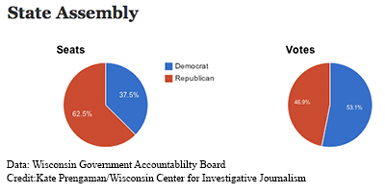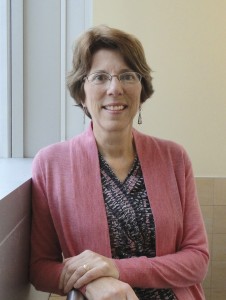A Call for Redistricting Reform
Given the distorted election results, good government groups want to reform the process of redistricting.
The Wisconsin Government Accountability Board’s Nov. 29 certification of the official results of the Nov. 6 election made it, well, official: Democratic candidates got more votes than Republicans in state races for president, U.S. Senate, U.S. House of Representatives, state Senate and state Assembly.
But the Republicans were able to keep a 5-3 lead in the U.S. House of Representatives, reclaim control of the state Senate by a margin of 18 to 15 seats, and secure a commanding 60-39 advantage in the state Assembly, despite getting fewer votes overall.
How can that be? Mike McCabe, the executive director of the Wisconsin Democracy Campaign, a nonpartisan elections watchdog, has a theory:
“The outcome of this year’s U.S. House as well as state Senate and state Assembly elections testify to the power of redistricting,” McCabe told the Wisconsin Center for Investigative Journalism.

Click to explore data visualization in a new page. In the 2012 elections, the parties’ share of seats didn’t match the share of votes they got.
The Center, using the newly released official results, has produced maps showing the Nov. 6 vote counts for each congressional and state legislative district. They depict a mostly red (Republican) state, even though Democrats got the most overall votes in every category.
In the races for Congress, Democrats snared 50.4 percent of the nearly 2.9 million votes cast. In the 16 races for state Senate, Democrats came away with 53 percent of the vote but lost two key seats. In the state’s 99 Assembly districts, Democrats got more than 52 percent of the vote, but won just 39 percent of the seats.
Wisconsin’s congressional and legislative voting districts were redrawn in secret by Republican lawmakers last year, based on the 2010 Census. This wasn’t the first time politics has intruded into the redistricting process, and any drawing of voter boundaries along geographically sensible lines will likely result in some inequities.
Consider this: In the Nov. 6 election, there were 23 Assembly seats considered so safely Democratic that no Republican was on the ballot, compared to just four seats that went to Republicans without a Democrat being in the race.
The nonpartisan League of Women Voters of Wisconsin has been pushing both parties to reform the redistricting process for decades, says executive director Andrea Kaminski. The these efforts haven’t gotten much traction because “the party in power wants to stay in power.” State lawmakers “are choosing their voters rather than the voters choosing them.”
Now the League is looking to partner with the Democracy Campaign, Common Cause in Wisconsin and other groups to take a fresh run at redistricting reform. It seeks an independent nonpartisan body to redraw voter boundaries to maximize the number of competitive seats, as is done in Iowa. Kaminski says her group favors doing this via state constitutional amendment, to protect against “the political winds of the day.”
Amending the state constitution is a multi-year process, which is why the League wants to begin now, starting with a public education campaign. Kaminski notes optimistically that lawmakers in power early in a given decade don’t have as great a stake as those later on, “when redistricting is about to take place.”
State Sen. Tim Cullen, D-Janesville, recently seconded this reasoning in remarks to Common Cause in Wisconsin, saying “this is the time to do the right thing. We don’t know who’s giving up the power that they’re going to have in 2021.”
Sen. Dale Schultz, R-Richland Center, has agreed to work with Cullen on this issue, as he has before. A resolution introduced by the pair and others in the 2011-12 Legislative session to accomplish this change with a state constitutional amendment died in committee. It wasn’t even given a hearing.
The nonprofit Wisconsin Center for Investigative Journalism (www.WisconsinWatch.org) collaborates with Wisconsin Public Radio, Wisconsin Public Television, other news media and the UW-Madison School of Journalism and Mass Communication. This story was a produced in collaboration with Wisconsin Public Television.
All works created, published, posted or disseminated by the Center do not necessarily reflect the views or opinions of UW-Madison or any of its affiliates.
-
Legislators Agree on Postpartum Medicaid Expansion
 Jan 22nd, 2025 by Hallie Claflin
Jan 22nd, 2025 by Hallie Claflin
-
Inferior Care Feared As Counties Privatize Nursing Homes
 Dec 15th, 2024 by Addie Costello
Dec 15th, 2024 by Addie Costello
-
Wisconsin Lacks Clear System for Tracking Police Caught Lying
 May 9th, 2024 by Jacob Resneck
May 9th, 2024 by Jacob Resneck






















